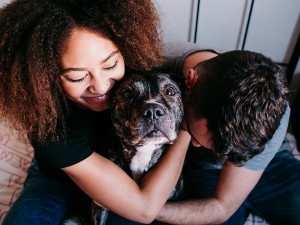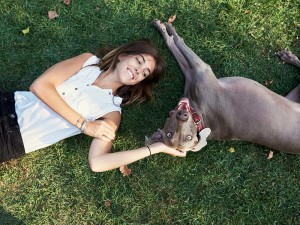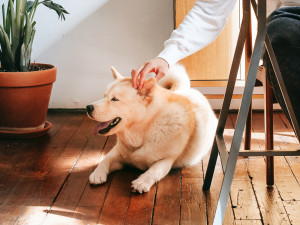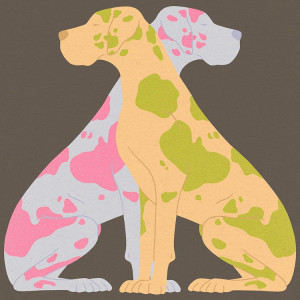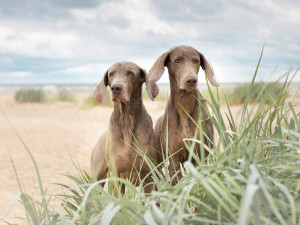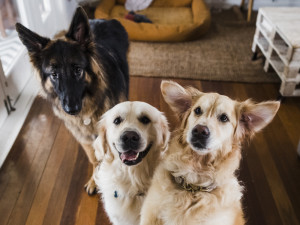AI Discovers 5 Different Dog Personalities—Which One Is Your Pup?
A new study says your dog could fall into one of these categories based on their reactions to real-life events.
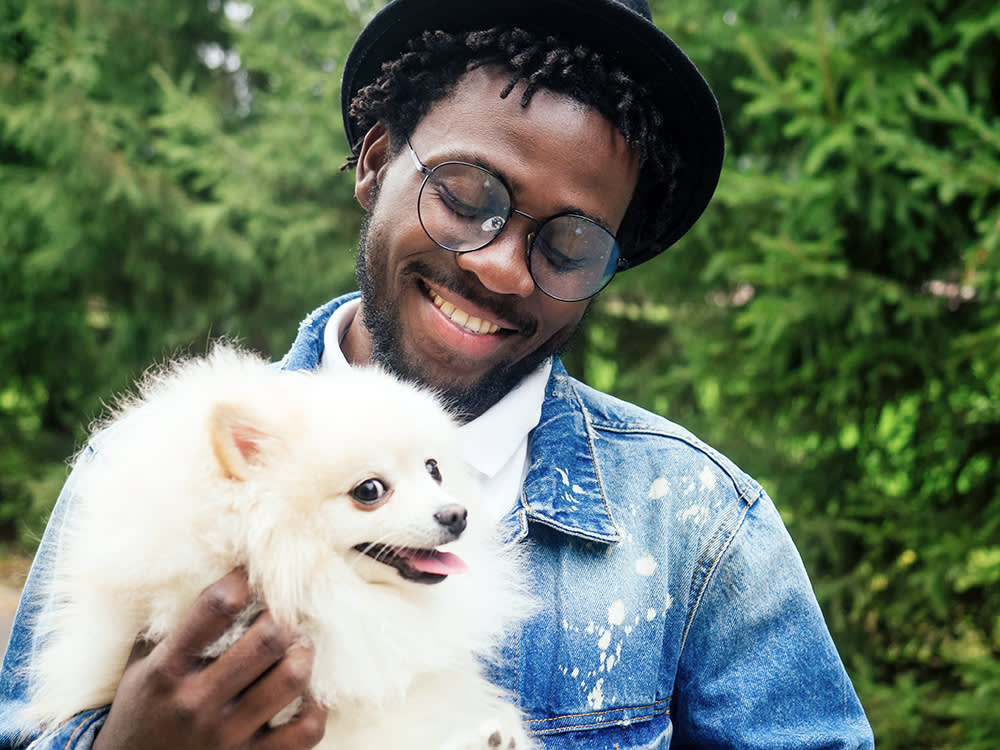
Share Article
As all dog parents know, dogs come in many spectacular shapes, sizes and breeds, but according to a new study they only have five distinct personality types. The study published in Scientific Reportsopens in a new tab took a new approach to predicting and categorizing dog personalities, using an artificial intelligence (AI) algorithm to search through 70,000 behavioral records of dogs to find common threads running through the breeds.
The research was conducted over two years by Dr. Mohammad Amirhosseini of the University of East Londonopens in a new tab, Professor James Serpell of the University of Pennsylvania’s School of Veterinary Medicine, and the U.S. canine technology start-up Dogvatar, who sponsored the study.

Get (totally free) deals for food, treats, accessories, tech, and way more pet parenting must-haves.
opens in a new tabWhat are the five personality types in dogs?
The researchers found that all dogs could be classified into five groups: excitable/hyper-attached, anxious/fearful, aloof/predatory, reactive/assertive, or calm/agreeable. To discover their personality traits, dogs in the database were scored on behaviors, such as how they responded when unfamiliar people visited their home or if they were jealous when their parent gave affection to another animal.
Why is it important to understand your dog’s personality type?
In the U.S., nearly 50 percent of people who surrender dogs to animal rescue orgs cite behavioral problems as a contributory factor. The researchers hope that the study’s results could help foster stronger bonds between humans and their dogs, paving the way for more effective training programs and tailored pet-parent interaction.
Lead author of the study, Dr. Mohammad Amirhosseini, said that the research could assist with dog-human matchmaking, as well as suitability for becoming a working dog. “We believe that our findings could help dog training agencies more quickly and accurately assess which animals are likely to succeed long-term in careers, such as aiding law enforcement and assisting persons with disabilities. The results could also be used for helping shelters with proper placement, thus reducing the number of animals returned for not being a good fit with their adoptive families.”
Clinical animal behaviorist Emily Birchopens in a new tab says that research into dogs’ personalities is not new; however, this new study could have a massive impact on understanding dog behavior.
“As a behaviorist, I certainly see these personalities within consults, and the repercussions of this when dogs and owners are poorly matched. However, I always err on the side of caution when labeling individuals. There will be a wide scale within these personality types and an element of crossover. The data is also still relying primarily on pet owner reporting of behaviors, which can vary with environment and situation, and change over time, so this is something to be taken into account.”
Personality type: excitable/hyper-attached
This personality type is characterized by relatively high levels of excitability, attachment/attention-seeking behavior, separation-related anxietyopens in a new tab, and reduced fear compared with the other personality types.
Birch says you’ll be able to spot an excitable/hyper-attached dog because they’re always busy and may have a little FOMO. “They get excited easily, take a long time to calm down, and are the life and soul of the party! They may be impulsive, thinking little about consequences before they act. They need to be with and around you and probably follow you on every toilet visit, in case they miss something exciting!”
Excitable dogs need humans who can cope with their extra energy and neediness, and recognize that their dog won’t be happy being alone for extended periods.
Personality type: anxious/fearful
Anxious/fearful dogs displayed relatively high fear of social (such as unfamiliar people and other dogs) and non-social events (new or unexpected situations). The anxious/fearful dog is cautious in disposition, thinking hard before doing things.
Birch believes they could be anxious because of past trauma. “But their personality type might go some way to explain why some dogs can be attacked by other dogs and still be dog-friendly, or treated terribly by humans but still happy and confident around them; whilst other dogs can have the smallest of things happen, but take it really deeply and are highly traumatized by the event.”
Anxious/fearful dogs are more likely to whine, jump up, or try to intervene when their parent strokes another animal, and they need patient parents willing to put in time to help them deal with fearful situations.
Personality type: aloof/predatory
Aloof/predatory dogs have lower levels of attachment/attention-seeking and higher levels of predatory behavior and aggression towards other dogs.
These dogs are notoriously hard to train, per Birch. “They will look at you when you call them, then trot off to carry on their own business. They’re happy in their own space and fiercely independent. They will happily go off hunting without a backwards glance and may even kill wildlife. They might give the illusion of being a bit dim but I assure you, they’re not.”
Parents of aloof/predatory pups must be consistent and find a way to motivate and reward a dog whose greatest joy is sniffing or chasing wildlife.
Personality type: reactive/assertive
Dogs who are reactive/assertive have heightened aggressive behavior across multiple domains, including aggression towards household members. Reactive dogsopens in a new tab tend to become aggressive when scolded or shouted at by their parents, and fearful of sudden loud noises, such as a vacuum cleaner being switched on or an object being dropped.
“These dogs are on the offensive and know what they like and do not like,” Birch says. “Their traits may have been bred into working dogs over generations – if you’re a shepherding breed, you need to be aware of predators and not be scared of seeing them off when protecting your livestock.”
With a reactive dog, work to identify the specific triggers that set your dog off. A trigger acts as a stimulus to make your dog react dramatically. After identifying triggers, try to avoid them while you work on a training plan, which should be based on positive reinforcement and patience.
Personality type: calm/agreeable
According to the research, calmer dogs were less likely to chase birds or cats than their counterparts and were quicker to learn new tricks or tasks. “They’re easy to live with, go with the flow and make great pets. They may not set the world on fire with their working ability, but they are worth their weight in gold,” Birch says.
Due to their peaceful nature, Birch rarely meets these dogs in her practice. Calm dogs tend to be ideal family dogsopens in a new tab because they’re great around young children. Or, if you’re getting older and want a dog who can match your pace, a calm canine could be precisely what you’re looking for.
How can this research be applied in the future?
Dr Amirhosseini says: “We are still working on analyzing the potential relationship between human personality traits and these dog personality types. Personality type and behaviors are closely intertwined, so a key future outcome is understanding effective training techniques for a dog’s personality type. In theory, in the future rescue organizations and shelters could use a tool to understand both a dog’s personality and how good a fit it is for the right owner.”

Catherine Renton
Catherine Renton is a writer based in Edinburgh whose work has been featured in Vogue, Elle, Glamour, Refinery29, and the Guardian, among others. When she's not writing, she is tending to the every whim of her cocker spaniel Bonnie, who loves belly rubs, people and chasing squirrels.
Related articles
![Man hugging his fluffy white dog happily]() opens in a new tab
opens in a new tabChemistry Between People and Dogs Is Real (It’s Science)
How the “love hormone” oxytocin connects us with our pups.
![A cute orange tabby kitten playing with feathers.]() opens in a new tab
opens in a new tabOrange Cat Behavior: Fact or Phenomenon?
Your TikTok algorithm would like you to think so, but the experts weigh in.
![Two colorful Great Danes illustration.]() opens in a new tab
opens in a new tabEver Ask Your Dog “Why Are You Like This?” DNA Is the Answer — Kind Of
This study says it’s actually less about what’s in their DNA and more about what’s on it.
- opens in a new tab
Male vs. Female Dogs: Are There Any Real Differences?
World-renowned behaviorist Patricia McConnell explains.
![3 dogs posed together in a house]() opens in a new tab
opens in a new tabDoes Your Dog Have a Unique Personality?
Yep, research says your dog is as special and perfect as you tell them they are.
![Back view of Saint Bernard puppy tail]() opens in a new tab
opens in a new tabHow to Tell if Your Dog is a Lefty or a Righty
Your dog’s wag and paw preference say a lot about their personality.
